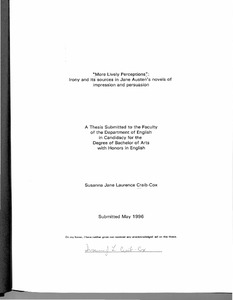| dc.rights.license | In Copyright | en_US |
| dc.creator | Craib-Cox, Susanna Jane Laurence | |
| dc.date.accessioned | 2023-10-20T15:49:39Z | |
| dc.date.available | 2023-10-20T15:49:39Z | |
| dc.date.created | 1996 | |
| dc.identifier | WLURG038_Craib-Cox_thesis_1996 | |
| dc.identifier.uri | https://dspace.wlu.edu/handle/11021/36292 | |
| dc.description.abstract | Irony comes from mainly from two sources in Jane Austen's writings: the juxtaposition of an impression or a persuasion with the truth of a situation. This can be seen most clearly in three novels: Lady Susan, which shows a heroine obliged to use both impression and persuasion to keep her relatives from discovering the truth of her affairs and dissolute lifestyle; Pride and Prejudice, which examines the power of impression and how it collapses when confronted with true knowledge of a situation; and finally, Persuasion, where the heroine is forced to find the strength to overcome the powerful persuasions of her family and friends, which would take her away from her beloved. These novels examine how women use impression and persuasion, and how it is used against them. But Austen's other novels also use impression and persuasion to examine a heroine's character, or to keep the story moving forward. . . . These two examples show the importance of impression and persuasion in Austen's other novels. They are crucial, although often irrational forces. There is no particular reason except instinct that could make all of these girls, except Lady Susan, reject apparently worthy and good suitors making serious offers of marriage. But they all do. There is no reason why they should be so instinctively aware of people who are good or bad, or persuaded away from their true feelings. The forces that guide them are usually without rhyme or reason, but they guide these heroines through the delicate manipulations that they either must avoid or orchestrate in order to find a husband. Most of Austen's novels examine the plight of young girls looking for a husband or quietly waiting for a lover to appear for them. They have little to guide them along their way. By using their impressions, and seeing how people try to persuade them, they can manage to be successful in the end. [From Conclusion] | en_US |
| dc.format.extent | 84 pages | en_US |
| dc.language.iso | en_US | en_US |
| dc.rights | This material is made available for use in research, teaching, and private study, pursuant to U.S. Copyright law. The user assumes full responsibility for any use of the materials, including but not limited to, infringement of copyright and publication rights of reproduced materials. Any materials used should be fully credited with the source. | en_US |
| dc.rights.uri | http://rightsstatements.org/vocab/InC/1.0/ | en_US |
| dc.subject.other | Washington and Lee University -- Honors in English | en_US |
| dc.title | "More lively perceptions": Irony and Its Sources in Jane Austen's Novels of Impression and Persuasion | en_US |
| dc.type | Text | en_US |
| dcterms.isPartOf | WLURG038 - Student Papers | en_US |
| dc.rights.holder | Craib-Cox, Susanna Jane Laurence | en_US |
| dc.subject.fast | Austen, Jane, 1775-1817 -- Criticism and interpretation | en_US |
| dc.subject.fast | Lady Susan (Austen, Jane) | en_US |
| dc.subject.fast | Pride and prejudice (Austen, Jane) | en_US |
| dc.subject.fast | Persuasion (Austen, Jane) | en_US |
| local.department | English | en_US |
